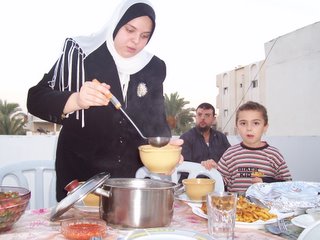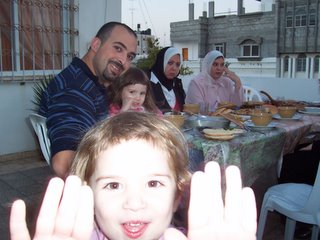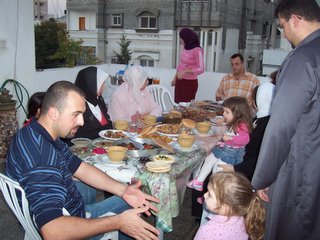


Celebrating the month of Ramadan is of course in some ways similiar to how we celbrate it in Sweden, but also in some ways very different. My experience of Ramadan in Gaza is of course depending on the traditions of my (husband's) family, but over all it seemes there are some general traditions.
In Sweden we invite or are invited for almost every iftar (the meal that breaks the fast), we eat dates and drink, then pray and eat soup and a simple meal. Here the tables are overwelmed by dish after dish. Each person actually get two plates to put food on beside from the soup-plate. At every iftar I'm under severe critic from my relatives beacuse I eat so "little", according to them. I guess swedish stumachs simply are smaller. It also seemes that it is not custom to invite other families for iftar.
In my opinion preparing so much food makes Ramadan all about eating, when it should be all about not eating. Ramadan is the month when you should try to evaluate your life and see what parts you perhaps need to improve, but I found that in general people here are satisfied with the level they're at. Which from one perspective is good - it's not healthy to never feel satisfaction I think, but on the other hand it leeds to stagnation - a stagnation that was one of the first things I noticed and disliked after arriving here. Not to say that I am better - I surely have my fair share of "things to deal with" but at least I'm holding on to the fact that I want to improve.
I join my family before iftar and help them with the preparations. At our table we are eight persons plus my three children. A few minutes before sunset we gather around the table, one of us stands by the window to hear the adhan (call for prayer) that signifies that the sun has set and we can all eat. After the iftar we (read the women) wash the dishes and then we drink arabic coffea and watch a syrian soapopera together.


7 comments:
You are right. Many people forget about the real meaning of Ramadan. Eat all night, sleep all day, get up right before mahgreb to pray. Some GAIN weight during Ramadan. A real shame.
Just curious - is it against Islam for the men to wash dishes?
Thanks, Imaan, for another really fascinating post. It is so interesting to read how you experience Ramadan, and particularly the end of each day's fast. And particularly, for me, to compare this with the experience of ending the Jewish Yom Kippur fast, which was last month. We have a special meal before and after the fast, but inviting or being invited to break the fast is very special and important. For us, it is a 26 hour fast we break, so by that time everyone does feel almost faint. I don't find it difficult, as it gets easier as you get older. I also find that people give you far too much to eat, but the Yom Kippur fast being so long, breaking it never produces the feeling you describe here.
There are many Jewish people who also lay more stress on how grand their before and after meals are, and how well they are dressed for synagogue, than on what the day is about. That's how people can be. You are blessed with the strength of your appreciation of what the day is about. That often happens with converts. And my feeling is that doesn't actually outweigh all the things you find difficult that you describe here.
It is strange. I love all our Jewish festivals, and they all involve some sort of feasting and celebration. Only Yom Kippur involves the difficulty of fasting (and spending the entire day in synagogue, where we are supposed to "afflict our souls"). Yet it is the one I love best...
It sounds like the pattern of who gets to do the housework is pretty much the same the world over...don't let anyone tell you different. All the studies about so-called new men show that it's still the women who do 90+% of the housework.
Salam alekum, Imaan:
Thanks for providing this portal to your area of Palestine. Many in the U.S. seek information about Palestine. As you may know the mainstream and even print medias here seldom cover it and when they do it is with a heavy dose of zionist spin.
I would imagine that it could be hard to write a blog about Palestine without getting political. Often I find it difficult not to read the comments section of a blogger's posting and on issues about Palestine they tend to have alot of zionist propaganda and other negative statements. I have noticed though that on two zionist blogs, any comments critical of "Israel" are deleted. Some of my friends have debated about whether the zionist lobby needs yet another forum on Palestinian blogs to pontificate.
Nice pictures on life there. May I suggest www.imemc.org and www.voicesofpalestine.org for your links section? Peace.
I am not battered, dear Ali. I'm just living in Gaza.
Nope, there is no quranic verse stating it is forbidden for men to wash the dishes - that's why you found me remarking upon it. For further references - I am the one who remarks on arabs and muslims here. But of course, I do it out of love.
Salaam Imaan!
How can the english blog been more intresting than the swedish one ;)maybe i should do one in english?!
I saw an comment from abu sinan,i really like hes blog,fun to see all the comments here.
take care and please come and visit me ....yeah right!
/Johanna,Syria
Wow Fasinating
Post a Comment